The UN and its role
Misunderstandings and misconceptions:
by Dr. Telli C. RAJARATNAM
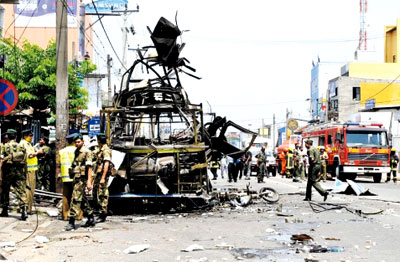
One of the many bomb explosions carries out by the LTTE
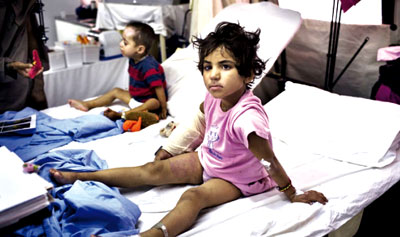
Civilian casualties caused by US troops in Afghanistan |
It was in 1948 that the vast majority of states signed the Universal
Declaration of Human Rights, committing themselves to respect over 30
separate rights for individuals.
As it was not a legally binding declaration and contained no
enforcement provisions, the declaration left states’ sovereignty intact,
but it was a first step towards tethering them to international,
universal obligations regarding their internal affairs.
Over decades, these human rights would come to enjoy ever stronger
legal status. One of the most robust human rights conventions, one that
indeed curtails sovereignty, even if mildly, through its arbitration
mechanisms, is the European Convention for the Protection of Human
Rights and Fundamental Freedoms, formed in 1950.
Roughly contemporaneous, signed on December 9, 1948, was the Genocide
Convention, committing signing states to refrain from and punish
genocide.
Then, in the mid-1960s, two covenants-the Covenant on Civil and
Political Rights and the Covenant on Economic, Social and Cultural
Rights-legally bound most of the world’s states to respecting the human
rights of their people.
Again, the signatories’ constitutional authority remained largely
intact, since they would not allow any of these commitments to infringe
upon their sovereignty. Subsequent human rights covenants, also signed
by the vast majority of the world’s states, contained similar
reservations.
The UN has condoned terrorism. Then what is this hue and cry about
war crimes? We must not forget that there is heavy lobbying for and on
behalf of terrorists by corporate interests.
One of the magnificent achievements of the UN has been the
transformation that has taken place in global opinion on the
relationship that should form between the governing and the governed,
between the government and the citizen.
It was on the basis of the moral authority of the General Assembly’s
Universal Declaration of Human Rights and the determined endeavours of
the Commission on Human Rights, that this transformation was achieved.
The dignity of the individual has now, largely as a result of United
Nations leadership in the field of human rights, been placed, as it
should be, among the priorities of national and international attention.
The Universal Declaration on Human Rights is not limited in scope to
ensuring the observance of human rights by Governments alone.
The Declaration has a far wider purpose: the observance of human
rights by all governmental and non-governmental parties alike.
Article 3 of the Universal Declaration, which requires that everyone
has the right to life; and the provisions of Article 30 of the
Declaration prescribes that: “Nothing in this Declaration may be
interpreted as implying for any State, group or person any right to
engage in any activity or to perform any act aimed at the destruction of
any of the rights and freedoms set forth herein”.
An act of terrorism by a non-governmental entity against civilians is
surely a violation of the human rights of its victims and, surely, a
crime against humanity as well.
We know the horrific consequences of terrorism: the horror; the
thousands of unsuspecting innocent lives lost or maimed, the thousands
of families then left to grieve; the countless personal tragedies that
terrorism leaves. The horrors of terrorism have devastated the country
and have cast a heavy burden on successive governments and the nation
including all of us and on humanity as a whole.
|
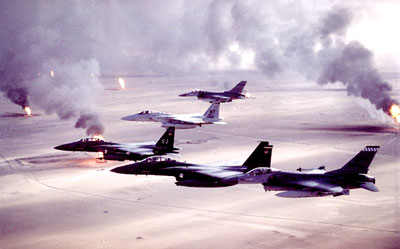
First Gulf War |
There are also the larger disruptions of national stability and order
as well: of the economy and the customary ways of life.
We remember the bombing of the Central Bank, the adjacent buildings,
the Temple of the Tooth Relic and other temples, the buses and trains in
Sri Lanka where numerous people of all communities were killed, injured,
the numerous innocent civilians who were killed and each of us would
have a story to tell about the injuries sustained or the deaths of our
loved ones.
All Tamil militants including the LTTE terrorised their own people.
They never changed - they earned money and still are marketing the
ultimate objectives of terrorism by slandering the Government. We will
always be affected by the memories of the damage caused by the
terrorists-this we shall carry with us for as long as we live.
The terrorism of September 11, 2001 in the USA gave rise to a
“coming-together” of the people, in the finest traditions of humanity.
On September 12, the Security Council and the General Assembly
convened to express: their collective condolences; an unqualified
condemnation of terrorism: a determination that those responsible should
not go unpunished; and firm concurrence that terrorism threatened the
foundations of human society and order and would need to be, and must
be, globally removed.
We have sent a message of determination and hope to the entire world.
Think of all the millions of innocent people who died in this bloody
century because democracies reacted too late to evil and aggression.
Because, the duty of the Defence Secretary was well-performed, the
past is gone not with helpless indignation, but with a hopeful
affirmation of human dignity and human rights for 2010.
In a world too divided by fear among people of different racial,
ethnic and religious groups, he has given confidence to the friends of
freedom and pause to those who would exploit human differences for
inhuman purposes.
Military necessity
Over 30 years or more, we have not been able to solve this problem.
We required a balance between the need to achieve a military victory and
the needs of humanity. In this sense, necessity has been viewed as a
limitation to unbridled barbarity.
The application of the doctrine of military necessity makes use of
the principle of proportionality as a mechanism for determining the
positioning of a fulcrum between these competing poles. Using
proportionality thus gives effect to the recognition that the choice of
methods and means of conducting war or armed conflict are not unlimited.
The means and methods of conducting war operate to achieve a
particular military objective, which consequently assists in achieving a
larger political objective.
While necessity might determine the legitimacy of the armed attack,
proportionality determines the amount of force that might be used. In a
sense, necessity operates at a macro level, while international
humanitarian law operates at a micro level, though both might lie on the
same continuum given the difficulties in the transition.
This difficulty is most apparent when the principles of necessity and
proportionality have been incorporated into conventional international
law, particularly international humanitarian conventions.
The development of these conventions and the application of these
principles require some consideration if one is to arrive at an
understanding of their application in a modern armed conflict. The
distinction in the Sri Lanka situation is that it is within our
territory.
Military necessity has been described as “a basic principle of the
law of war, so basic, indeed, that without it there could be no law of
war at all.”
The acceptance that, while the object of warfare is to achieve the
submission of the enemy, which may require the disabling of as many
enemy combatants as possible, this should only be achieved in a manner
that does not cause any unnecessary suffering or damage.
This limitation to the means of waging war is not, however,
necessarily humanitarian in nature, and much of the early restraints
were based on economic, political, and military considerations.
However, the need for a balance between the considerations of
humanity and the military actions necessary to win a war is regarded as
defining the very nature of international humanitarian law, making
military necessity a central principle in this balance.
The ‘principle of distinction’ is fundamental to humanitarian law,
but its precise content varies according to the kind of conflict. In
national liberation struggles - and international armed conflicts - the
distinction is between ‘civilians’ and ‘combatants.’ Combatants have no
right to life under humanitarian law.
Every individual is classified as either a combatant or as a kind of
protected person, such as a prisoner of war (a captured combatant) or a
civilian. An individual’s rights change when his classification changes.
A civilian has the right not to be targeted for attack and the right
to receive some protection from attack. If the civilian joins the armed
militants, he exchanges the rights of a civilian for the rights of a
combatant. A combatant has the right to take part in hostilities.
If the UN condemns Terrorism, the UN should accept military
necessity.
Sri Lanka still faces great challenges in this world, but we will
meet them. We will as a nation successfully maintain the territorial
integrity of Sri Lanka.
The current trends in international affairs relating to Sri Lanka
with the war against terrorism and how the world looks at us owing to
the accusations made against us by vested interests and whether we have
overcome the difficulties and convinced the world that we were justified
in doing what we had to do is yet to be seen.
The recurring problem of accusations is a result of the frustrated
Tamil militants overseas trying to revive the LTTE for their own
survival.
All countries should foster a new security concept featuring mutual
trust, mutual benefit, equality and cooperation and fully respect the
diversity of world civilisations, and should seek consensus through
dialogue, co-operation through consultation and development through
exchanges.
Solidarity is strength
History tells us that solidarity means strength, progress and
success. Peace, co-operation, development and progress are what the
entire international community is hoping and striving for.
The developing nations must continue to work closely together in the
spirit of solidarity and co-operation and raise their voice and
strengthen their position in international affairs if they are to secure
their fundamental interests.
The late Lakshman Kadirgamar is remembered to have said,”A criminal
organisation-whether involved in rebellion against a State or not-must
depend for its sustenance outside the law. For its massive operations
and massive weaponry, massive collections of funds are continually
required.
As funds available for criminal activities within a State, especially
a developing State, are inevitably small, and the monitoring of their
collection and disbursement relatively simple, fund collection for such
activities is carried out abroad-through international criminal
networks, of course-and also, as in all criminal enterprises, through
knowing or unknowing front organisations or other entities that now
proliferate in many forms, in many countries-often in the guise, sadly,
of charitable groups or groups ostensibly concerned with human rights,
ethnic, cultural or social matters.....
The many disparate forces for international terrorism do not come
together in one monolithic whole. They are variously inter-connected in
numerous ways and their international networks are extensive.
They are mutually supportive and communicate through the global
underworld of crime when special missions are afoot. If international
terrorism is to be ever removed from our midst, we must begin with the
recognition that international terrorism is a form of global
criminality.
We must not let ourselves be deceived by the artfully crafted cloaks
of false pretensions. It is the method of terrorism as in the murder of
innocent civilians and the defiance of the sanctity of life-that defines
terrorism.
“This is self-explanatory of the fact that accusations are being made
by certain corporate interests having links with Tamil terrorists and
Tamil militant political parties who wear a mask of democracy and
undermine the very pillars of a sovereign state for their own survival.
We look for diplomacy. But there is no diplomacy with some of those
opposed to us. We do not consider them opponents, but they oppose every
conceivable move we make to develop the country. Sometimes, there is no
compromise with such people, no meeting of minds - no point of
understanding - so we would have a just choice -defeat it or be defeated
by it.
This is where there was a necessity for military intervention. We
learnt that however much we strive for peace, we need a strong defence
capability where a peaceful approach fails. Whatever the dangers of the
action we take, the dangers of inaction are far greater.
Morality of wars
Throughout history war has been the source of serious moral
questions. Today, war is seen by some as undesirable and morally
problematic. At the same time, many view war, or at least the
preparation and readiness and willingness to engage in war, as necessary
for the defence of their country and therefore a just war.
Support for war continues to this day, especially regarding the
notion of a Just War (necessary wars required to halt an aggressor or
otherwise dangerous nation or group).
International law recognises only two cases for a legitimate war:
* Wars of defence: when one nation is attacked by an aggressor, it is
considered legitimate for a nation along with its allies to defend
itself against the aggressor.
* Wars sanctioned by the UN Security Council: when the United Nations
as a whole acts as a body against a certain nation. Examples include
various peacekeeping operations around the world, as well as the Korean
and first Gulf Wars.
The subset of international law known as the law of war or
international humanitarian law also recognises regulations for the
conduct of war, including the Geneva Conventions.
Article 2, paragraph 7 of the UN Charter states:
“Nothing contained in the present Charter shall authorise the United
Nations to intervene in matters which are essentially within the
domestic jurisdiction of any State or shall require the members to
submit such matters to settlement under the present Charter.”
Sovereignty, though its meanings have varied across history, also has
a core meaning, supreme authority within a territory. It is a modern
notion of political authority. Historical variants can be understood
along three dimensions-the holder of sovereignty, the absoluteness of
sovereignty, and the internal and external dimensions of sovereignty.
The State is the political institution in which sovereignty is embodied.
* The history of sovereignty can be understood through two broad
movements, manifested in both practical institutions and political
thought. The first is the development of a system of sovereign states,
culminating at the Peace of Westphalia in 1648. Contemporaneously,
sovereignty became prominent in political thought through the writings
of Machiavelli, Luther, Bodin, and Hobbes.
The second movement is the circumscription of the sovereign state,
which began in practice after World War II and has since continued
through European integration and the growth and strengthening of laws
and practices to protect human rights. The most prominent corresponding
political thought occurs in the writings of critics of sovereignty like
Bertrand de Jouvenel and Jacques Maritain.
A definition of Sovereignty
Supreme authority within a territory-this is the general definition
of sovereignty. Historical manifestations of sovereignty are almost
always specific instances of this general definition.
It is in fact the instances of which philosophers and the politically
motivated have spoken most often, making their claim for the sovereignty
of this person or that body of law. Understanding sovereignty, then,
involves understanding claims to it, or at least some of the most
important of these claims.
Sovereignty can also be absolute or non-absolute. How is it possible
that sovereignty might be non-absolute if it is also supreme? After all,
scholars like Alan James argue that sovereignty can only be either
present or absent, and cannot exist partially. But here, absoluteness
refers not to the extent or character of sovereignty, which must always
be supreme, but rather to the scope of matters over which a holder of
authority is sovereign.
Bodin and Hobbes envisioned sovereignty as absolute, extending to all
matters within the territory, unconditionally. It is possible for an
authority to be sovereign over some matters within a territory, but not
all.
Today, many European Union (EU) member states exhibit
non-absoluteness. They are sovereign in governing defence, but not in
governing their currencies, trade policies, and many social welfare
policies, which they administer in co-operation with EU authorities as
set forth in EU law. Absolute sovereignty is quintessential modern
sovereignty. But in recent decades, it has begun to be circumscribed by
institutions like the EU, the UN’s practices of sanctioning
intervention, and the International Criminal Court.
A final pair of adjectives that define sovereignty is “internal” and
“external.” In this case, the words do not describe exclusive sorts of
sovereignty, but different aspects of sovereignty that are co-existent
and omnipresent. Sovereign authority is exercised within borders, but
also, by definition, with respect to outsiders, who may not interfere
with the sovereign’s governance.
Only a practice of human rights backed up by military enforcement or
robust judicial procedures would circumscribe sovereignty in a serious
way. Progress in this direction began to occur after the Cold War
through a historic revision of the Peace of Westphalia, one that
curtails a norm strongly advanced by its treaties-non-intervention.
In a series of several episodes beginning in 1990, the United Nations
or another international organisation has endorsed a political action,
usually involving military force, that the broad consensus of states
would have previously regarded as illegitimate interference in internal
affairs.
The episodes have involved the approval of military operations to
remedy an injustice within the boundaries of a State or the outside
administration of domestic matters like police operations. Unlike
peacekeeping operations during the Cold War, the operations have usually
lacked the consent of the government of the target State. They have
occurred in Iraq, the former Yugoslavia, Bosnia, Kosovo, Somalia,
Rwanda, Haiti, Cambodia, Liberia, and elsewhere.
Although the legitimacy and wisdom of individual interventions is
often contested among states. The U.S. bombing of Iraq in December 1999
and NATO’s intervention in Kosovo, for instance, failed to elicit U.N.
Security Council endorsement, as did the U.S. invasion of Iraq in 2003.
The broad practice of intervention is likely to continue to enjoy broad
endorsement within the U.N. Security Council and other international
organisations.
An explicit call to revise the concept of sovereignty so as to allow
for internationally sanctioned intervention arose with The
Responsibility to Protect, a document written and produced in 2001 by
the International Commission on Intervention and State Sovereignty, a
commission that the Government of Canada convened at the behest of U.N.
Secretary General Kofi Annan.
The document proposes a strong revision of the classical conception
by which sovereignty involves a “Responsibility to Protect” on the part
of a State towards its own citizens, a responsibility that outsiders may
assume when a State perpetrates massive injustice or cannot protect its
own citizens.
Responsibility to Protect has garnered wide international attention
and serves as a manifesto for a concept of sovereignty that is
non-absolute and conditional upon outside obligations.
This is the moment we need more English media coverage to defend our
military strategy as a matter of human necessity to save the Nation from
the grip of terrorism. There should be more discussions, analysis and
submissions so that the UN realises its mistake by appointing a panel
quite contrary to the norms required for a member state of the United
Nations.
Come let us join together as citizens of this beautiful isle. Let me
quote Jesus Christ who said “ He that is without sin amongst you, let
him cast the first stone”.
NAM deeply concerned over Ki-moon’s move

The 118-member Non-Aligned Movement (NAM), currently chaired by
Egypt, has reiterated its opposition to the Panel of Experts on Sri
Lanka appointed by the UN Secretary General.
The NAM has expressed “deep concern” over Ki-moon’s unilateral
decision.
In an earlier letter to the UN Chief, the NAM said he was attempting
to violate the U.N. Charter and trying to interfere in the domestic
affairs of a Member State.
“The Non-Aligned Movement strongly condemns selective targeting of
individual countries, which it deems contrary to the founding principles
of the Movement and the United Nations Charter,” said Ambassador Maged
Abdelaziz of Egypt, in a letter to Ki-moon.
“As you are surely aware, the President of Sri Lanka has already
confirmed in public his intention to appoint a domestic mechanism to
address accountability issues, voluntarily,” the NAM Chair said. Such a
mechanism has now been appointed.
The NAM pointed out that neither the Security Council, nor the
General Assembly, or its subsidiary Human Rights Council, have made any
pronouncements on alleged human rights violations in Sri Lanka or
mandated any particular course of action.
“The situation in Sri Lanka is not on the agenda of any of these
bodies, and there is nothing in the U.N. Charter that authorises
intervention in matters which are essentially within the domestic
jurisdiction of any State,” according to NAM.
Echoing Sri Lanka’s views, the NAM said the appointment of a UN panel
of experts “could do more harm than good to the country’s ongoing and
relentless efforts aimed at reinforcing reconciliation and national
unity.” The NAM wished “to underscore the need to allow enough space and
time for the Government of Sri Lanka to complete its own domestic
processes, without interference or unsolicited assistance” from the
United Nations.
China voices reservations
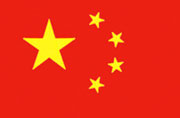 China which also has veto powers in the UN Security Council had also
expressed strong reservations over the UN Secretary General’s move. China which also has veto powers in the UN Security Council had also
expressed strong reservations over the UN Secretary General’s move.
China was among the countries which staunchly defended Sri Lanka’s
war against terrorism and helped defeat a move by Western powers to
censure Sri Lanka at the UN Human Rights Council soon after the war
ended in May last year.
China has cooperated fully with Sri Lanka in its efforts to contain
terrorism.
Russia slams UN
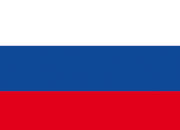 Russia slammed the United Nations Secretary-General Ban Ki-moon’s
decision to appoint a panel of experts to advise him on Sri Lanka’s
alleged violations of human rights and humanitarian law during the last
stages of the battle against LTTE terrorists, without regard to the
sovereignty of Sri Lanka. Russia slammed the United Nations Secretary-General Ban Ki-moon’s
decision to appoint a panel of experts to advise him on Sri Lanka’s
alleged violations of human rights and humanitarian law during the last
stages of the battle against LTTE terrorists, without regard to the
sovereignty of Sri Lanka.
The Russian Federation’s Ministry of Foreign Affairs, in a statement,
criticised the UN Chief for not asking the opinion of the UN Security
Council or the General Assembly on this matter before appointing the
panel.
“In doing so, the UN Secretary-General as chief administrative
officer of the United Nations should apparently have asked the opinion
of the Security Council or the General Assembly on this matter. But this
has not happened. What also makes us cautious is the fact that this
decision was taken without regard to the position of a sovereign state
and a member of the UN - Sri Lanka,” the Russian Foreign Ministry said.
Russia said that Under-Secretary-General for Political Affairs B.
Lynn Pascoe visited Sri Lanka before the UN Chief’s appointment of the
panel and he was aware of Sri Lanka’s stand that the panel was
unwarranted and unnecessary.
The Russian Foreign Ministry pointed out that Sri Lanka has already
begun its own investigation process at national level with the
appointment of the Commission on Lessons Learnt and Reconciliation with
a mandate to review all aspects of the conflict.
UN Chief revealing hidden agenda - Minister
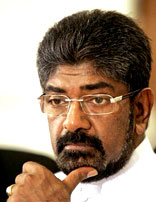 By attempting to provide oxygen to the LTTE which has been wiped out
and to blow up its image before the international community, the United
Nations and its Secretary General have revealed their hidden agenda in
no uncertain terms, Media Minister Keheliya Rambukwella said. By attempting to provide oxygen to the LTTE which has been wiped out
and to blow up its image before the international community, the United
Nations and its Secretary General have revealed their hidden agenda in
no uncertain terms, Media Minister Keheliya Rambukwella said.
He said it is a matter for suspicion when one considers the actions
of certain world organisations and their representatives who remained
silent when the LTTE were massacring innocent civilians over 30 years.
Addressing a meeting at his office in Kandy last week, the Minister
asserted that it is an inalienable right of a sovereign and independent
nation to take its own decisions.
He said the President has appointed an impartial Commission to probe
into the activities during the conflict and beyond that no one has the
power to appoint any commission or inquiry board.
The Minister said the Security Forces conducted its humanitarian
operation respecting all norms and traditions, with no harm caused to
the civilian population.
He said the manner in which they carried out the humanitarian
operation was an example to all armies in the world.
UN interference is violation of Constitution - Wickramanayaka
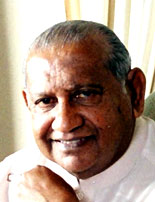 Attempts by the UN to interfere in Sri Lanka’s internal affairs is a
violation of the Constitution, Public Management Reforms Minister
Ratnasiri Wickramanayaka said. Attempts by the UN to interfere in Sri Lanka’s internal affairs is a
violation of the Constitution, Public Management Reforms Minister
Ratnasiri Wickramanayaka said.
Although Sri Lanka is a member of the United Nations, the
organisation should not be allowed to interfere in Sri Lanka’s internal
affairs, he added.
The Minister made these comments at a function at Taxila Central
College, Horana to provide assistance to low income families in the
area.
Minister Wickramanayaka also emphasised the need to strengthen the
local economy and give pride of place to locally manufactured products.
He was of the view that Sri Lanka should refrain from importing milk
food items and emphasised the need to achieve self-sufficiency in this
regard.
He noted that Sri Lanka should not only depend on traditional methods
to drive its economy forward, but also embrace viable modern trends.
Akashi commends peace-building, reconciliation efforts
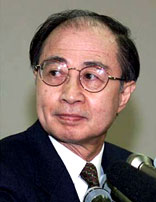 The United Nations (UN) should not interfere in Sri Lanka, but only
offer suggestions and ideas in dialogue with the Government, visiting
Japanese Special Envoy Yasushi Akashi told reporters in Colombo last
week. The United Nations (UN) should not interfere in Sri Lanka, but only
offer suggestions and ideas in dialogue with the Government, visiting
Japanese Special Envoy Yasushi Akashi told reporters in Colombo last
week.
Adding that the proposed UN panel to advise Secretary General Ban Ki-moon
on Sri Lanka could be useful, Akashi noted that its purpose should be to
offer insights or views to the Government (if needed), which has also
created its own Commission of Lessons Learnt and Reconciliation.
While welcoming the Government’s intent to appoint the Commission as
a positive step towards peace-building and reconciliation efforts in the
post conflict era, Akashi said Sri Lanka could count on the assistance
of the Japanese Government to build on the efforts.
Ending his 20th visit to the country, Akashi expressed optimism of
the positive changes taking place in post-conflict Sri Lanka, saying
that it was a great opportunity for national and ethnic reconciliation.
Commenting on his experiences during a visit to the formerly
war-ravaged North, Akashi noted that he was quite struck by the changes
he had witnessed as changes for the better.
Alleviation of tension and disappearance of the atmosphere of fear
which prevailed earlier were quite evident, he said.
Commending the progress of IDP resettlement, Akashi said a lot more
had to be done to improve their livelihood. Replying to media queries on
the negative attitude of certain governments, NGOs and sections of the
Tamil Diaspora, Akashi noted that they should be informed about what is
really taking place in Sri Lanka.
Rather than condemn and criticise, it is important to understand the
nature of challenges Sri Lanka is faced with.
Iran strongly opposes UN move
 Iran has said it strongly opposes the measure taken by the United
Nations Secretary General against Sri Lanka. Iranian Minister Ali
Udazath, who is currently in Malaysia to attend the conference of
ministers of housing development, says Sri Lanka has set an example to
the world by expressing a clear stance against the UN chief’s decision. Iran has said it strongly opposes the measure taken by the United
Nations Secretary General against Sri Lanka. Iranian Minister Ali
Udazath, who is currently in Malaysia to attend the conference of
ministers of housing development, says Sri Lanka has set an example to
the world by expressing a clear stance against the UN chief’s decision.
He has told Minister Wimal Weerawansa who is also participating in
the event that imposing conditions and panels against a country which is
moving forward after eradicating terrorism is clearly unacceptable. |

